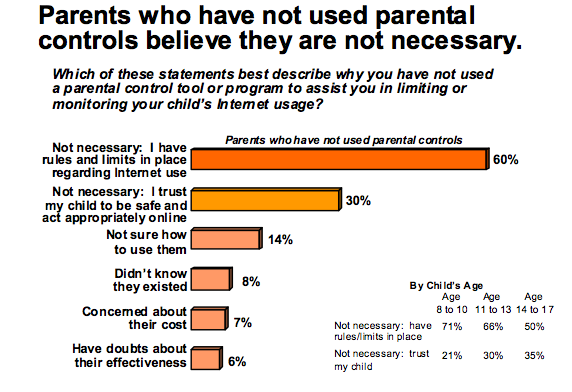For many years I have said that the best way to protect children on the Internet is to develop the filter that runs in the computer between their ears and, based on a recent survey commissioned by the Family Online Safety Institute (FOSI), a lot of parents apparently agree.
For the most part, parents do have a clue when it comes to helping their kids stay safe online.
FOSI commissioned Hart Research Associates to interview 702 parents of children eight to 17. The study, which has a margin of error of plus/minus 3.7%, found that “Nearly all parents surveyed (96%) say they have had a conversation with their child about what to do and not to do online.”
Controls have their place
But that’s not to say parental controls tools don’t have their place. Just over half the parents (53%) said that they do use some type of tool to control or monitor their child’s online behavior using products ranging from filtering programs on their PC that limit what sites a child can visit to services that monitor children’s activities online or on mobile devices.
Even though 47% of parents don’t use these tools, 87% of them are aware that such tools are available for personal computers, but parents are less likely to use and be aware of parental control tools on other devices that kids use to go online. For example, while 75% of parents feel very or somewhat comfortable about monitoring their kids’ online use, awareness of parental controls drops to 37% for game consoles (44% among parents whose kids use consoles to access the Internet). Just over a third (35%) of parents say they are “aware of parental controls offered by wireless companies” and only 39% of parents whose child uses a smartphone to access the Internet “say they know of parental control technologies,” according to the study. Just over half (51%) of parents said that their child uses something other than a computer to access the Internet.
Parents set rules
It’s good news that 93% of parents say they have set rules or limits on their children’s online with nearly eight out of 10 (79%) saying that they only allow kids to use a computer in a common area of the house rather than a bedroom. Of course, in an era when many kids are using laptops or even tablets and phones to go online, I’m not sure if parents can easily enforce that rule, but at least they’re thinking about it.
Three quarters of the parents (75%) have rules for how much time or the time of day their kids can be online but as kids get older, parents become more relaxed about these rules. Whether that is a good or bad thing depends on the child. Many teens have pretty well developed internal “filters between their ears,” but there are some who actually take more risks than younger children. While monitoring teen behavior is always trickier than monitoring behavior of young children, it’s sometimes even more necessary, though often an occasional conversation is all that’s needed.
Family ‘Online Safety Contract‘
Ten percent of the parents said they have signed a “family online safety contract” that outlines rules and expectations. Several years ago I created separate online safety pledges for kids and parents.
The fact that nearly half parents sampled don’t use parental control tools isn’t necessarily a bad thing. When asked why, the most common reason was that they’re not necessary, “either because of rules and limits already in place (60%), and/or because they trust their child to be safe (30%).”
I completely understand where these parents were coming from. Even though I was one of the first people on the planet to test out parental controls in the nineties when my kids were young (and testified as to their efficacy in a federal court trial), my wife and I elected not to use them at our house because we preferred more old fashioned “tools” like frequent conversations with our kids and placing computers in public areas of the house.
Filters and monitoring tools can be a valuable resource and I urge parents to at least think about including them in their vast arsenal of parenting tools, but I also urge parents to never rely on them as the only safeguard. The best way to protect your kids online is to talk with them about their Internet use and anything else on their minds. Have dinner together as a family, ask your kids what’s going on in their lives and be as non-judgmental as appropriate so your kids trust you and confide in you. Studies have shown that – despite outward appearances – children and even teenagers heavily rely on their parents for advice and guidance.
Besides, with any luck your kid will someday grow up and move somewhere where there are no filters, no monitoring programs and no parents over their shoulder. Let’s just hope that, by then, that filter between their ears is well developed.
For more on internet safety visit Larry’s SafeKids.com blog andConnectSafely.org


Be the first to comment